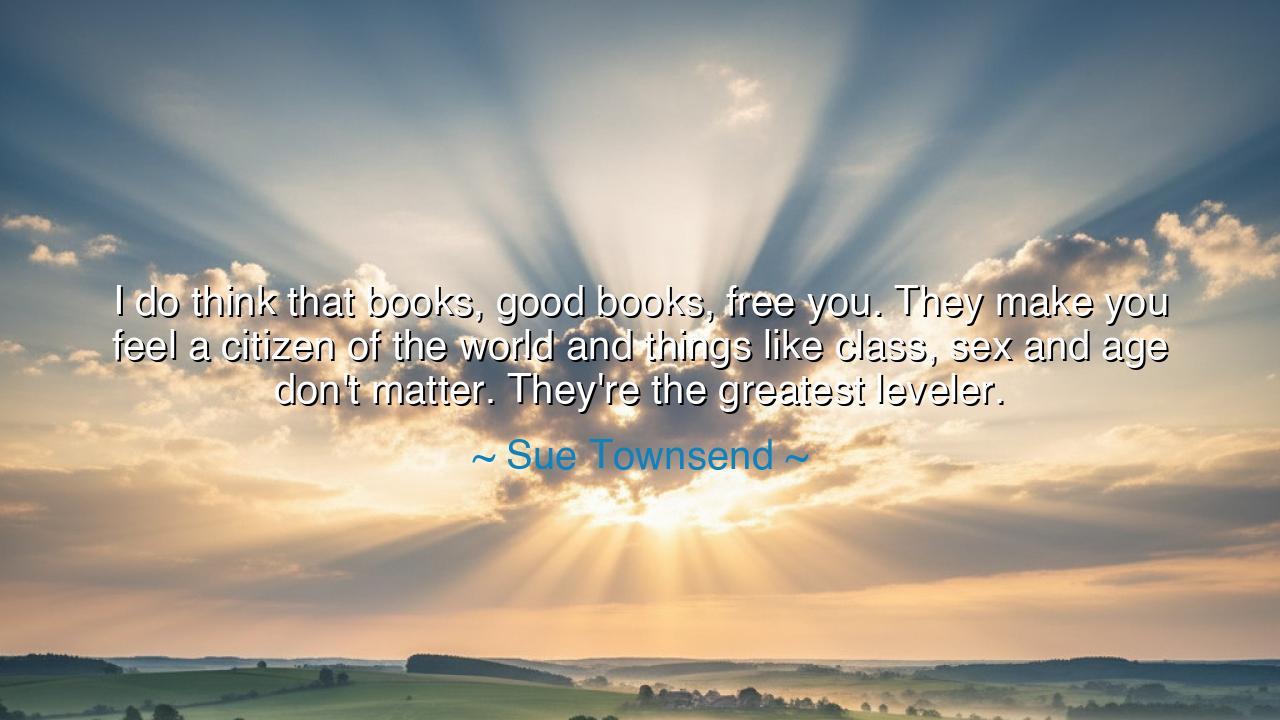
I do think that books, good books, free you. They make you feel a
I do think that books, good books, free you. They make you feel a citizen of the world and things like class, sex and age don't matter. They're the greatest leveler.






In the words of Sue Townsend, “I do think that books, good books, free you. They make you feel a citizen of the world and things like class, sex and age don’t matter. They’re the greatest leveler.” These words carry the quiet strength of truth shaped by experience. Townsend, the beloved creator of Adrian Mole, speaks here not merely as a writer, but as one who understood the human spirit’s hunger for freedom—the kind that cannot be won through wealth or status, but only through the life of the mind. Her words celebrate books not as objects of luxury or education alone, but as instruments of liberation—tools through which the soul transcends the boundaries set upon it by society.
To say that books free you is to say that they awaken the mind to infinite possibility. When one reads, one leaves behind the narrow walls of circumstance and enters the vast plains of imagination. In those quiet pages, the poor may walk as kings, the young may speak with the wisdom of age, and the oppressed may feel the air of justice and dignity denied to them in life. Books open doors where none seem to exist. Townsend’s own life was a testament to this truth—born into working-class Leicester, she left school at fifteen and worked humble jobs before the library became her cathedral. There, amid the scent of paper and dust, she discovered that knowledge is the great equalizer, and that a mind fed by stories is richer than any palace.
This belief echoes through the centuries. The philosopher Epictetus, born a slave in ancient Greece, taught that true freedom is not the absence of chains but the mastery of one’s own mind. His wisdom, preserved in writing, traveled across empires and generations, liberating others who had never known his name. Similarly, the self-educated Frederick Douglass wrote that “once you learn to read, you will be forever free.” For Douglass, who had been enslaved, reading was an act of rebellion—each word a weapon against ignorance and tyranny. Townsend’s words spring from the same well of understanding: that literature is the soul’s revolt against confinement, and that every good book is a ladder leading upward.
When Townsend says that books make one “a citizen of the world,” she means that reading dissolves the false borders of nation, gender, or class. Through books, we dwell among countless lives. We walk beside Tolstoy’s peasants in Russia, dream with Tagore in Bengal, mourn with Toni Morrison’s ghosts in America. In the realm of story, no passport is required. The human condition—its love, fear, and longing—binds all who read. Thus, the reader becomes a citizen of the world, belonging not to one tribe but to all of humanity. This is why, as Townsend insists, books are the greatest leveler—for within their pages, no one is excluded.
History has shown that tyrants fear books precisely because they free the mind. The burning of libraries, the banning of novels, the silencing of poets—all are acts of fear by those who know that ideas cannot be shackled. When Victor Hugo wrote Les Misérables, he did not merely tell a story of revolution; he offered redemption to the poor and the forgotten. When Harriet Beecher Stowe penned Uncle Tom’s Cabin, her words stirred a nation’s conscience and hastened the fight against slavery. In every age, it is literature that has carried the torch of empathy, breaking through barriers that politics and power could not.
The lesson, then, is clear: seek your freedom in knowledge. Read not for pleasure alone, but for transformation. Let books become your compass, guiding you through the complexities of life and reminding you of your shared humanity with those beyond your borders. Teach children that a book is not a burden, but a bridge; not a pastime, but a path. For in reading, one does not merely learn facts—one learns how to live.
So, my child, heed the wisdom of Sue Townsend. When the world divides you by class, sex, or age, turn to the written word. Let stories remind you that you are larger than the labels placed upon you. Each book you open is a door to freedom, a voice whispering that the world is yours to know and to love. And when you have read enough to feel that freedom burning within you, pass it on—lend your books, share your stories, and help others rise with you. For the mind that reads is the mind that cannot be conquered, and the heart that understands through words is the heart that makes the world whole.






AAdministratorAdministrator
Welcome, honored guests. Please leave a comment, we will respond soon